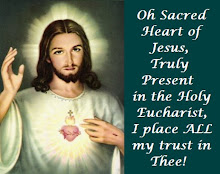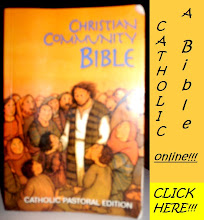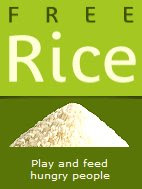Last Friday, upon clearing up my desk - which incidentally is a task i hate doing - i came across a book titled “Images of Jesus", John Bowden's translation of the book "Bilder von Jesus" by a German Benedictine monk called Fr. Anselm Grűn. I remember buying it few months back but had never actually sat down to read it... I kept on clearing up but made it a point that just after i finish that i'd read a bit of it - i don't care which bit but i was just going to read something out of it.
I have a habit of going through stuff before actually reading anything - and when i read i do not neccessarily start from the beginning nor finish at the end (...but i'm sure many other people do that too ;-) I just flipped through the pages and stopped on a chapter - not bothering much which it was. I liked it sooo much that i am putting it on here. Not solely because i truly loved it but more so because it kind of relates to today's Gospel :-)
-----

"Jesus the Bread.
In his novel “And Never Said A Word”, Heinrich Bőll tells of the poverty of the Bogner family, who live with their three children in one room. Their poverty is contrasted with the wealth of the childless Franke couple. Mrs Franke is a leading light in the church circles. Every morning she goes to Communion and receives the Body of Christ. But that doesn’t make her sensitive to the poverty of Katy and Fred Bogner. On the contrary she lords it over them. Frau Franke receiving the Body of Christ is contrasted with the reverent way in which the Bogners treat bread. In the poverty of the post war period, Katy Bogner knows the value of the bread that feeds her and her children. For Bőll bread is a symbol with almost magical connotations. In the daily bread something becomes clear of Jesus, whose words touch Katy’s heart and feed her in the midst of her poverty.
Bread stands for all that we hunger for; it stands for what feeds us, what we can live on. Bread strenghtens us for every day life. When wandering through the wilderness, the Israelites hungered for bread. And God Himself gave them bread to eat. He made manna fall from heaven. The Israelites satisfied their hunger with manna on the way through the wilderness. Jesus was bold enough to call Himself the Bread that satisfies our hunger: “I am the Bread of Life: whoever comes to me will never hunger.” (Jn 6:35) This claim was a provocation for the Jews. Jesus uses the term ‘bread’ of His own person. He claims that He can satisfy our deepest hunger. A woman like Katy Bogner in Bőll’s novel understands this saying. She has an idea that something goes out from this Jesus from which He can draw hope in her poverty. Whereas the watery homilies preached in church leave her cold, her heart is touched by the ‘husky song of a Negro’ which penetrates everything ... and he never said a mumbling word ... and never said a word’.
Jesus compares the bread that He is with the manna that the Israelites ate in the wilderness. They ate the manna, yet they died. “But this is the bread which comes down from heaven: if anyone eats it he will not die. The bread that I shall give is my Flesh, for the life of the world.” (Jn 8:50f.). In the midst of the wilderness, Jesus claims that He can feed us. In the wilderness of poverty, in the wilderness of inner emptiness, in the chaos of feelings, a word of Jesus can be nourishment that allows us to travel on. Katy Bogner experienced that. “When I lie awake at night and weep, when everything is finally silent, I often feel that I get through. Then nothing matters to me, house and dirt, even the poverty; even the fact that you’re away doesn’t matter to me.” When Jesus’ word touches her, when she senses Jesus’ presence, she is fed in the midst in the wilderness, she experiences life in the midst of death.
Jesus identifies the bread that He distributes with the Flesh that He gives for the life of the world. He becomes the bread that feeds us precisely where He hangs helplessly on the cross. It’s a provocative paradox: the dying man becomes food for the living. And yet this paradox matches our experience. If someone gives Himself for us unconditionally, as Jesus did on the cross, we can live by it; then it’s food for us which supports us in all the distress in our life. On the cross Jesus is as it were baked for us in the fiery oven of suffering. It’s love that makes Him the Bread that feeds us. In the end of the day our longing is always to love and be loved. Jesus who loves us to the end of the cross – as John puts it in his Gospel – satisfies our longing. In His unconditional love for us, He becomes the Bread that feeds us with our lack of the experience of love.
Many people stuff themselves with food so as not to feel their lack of love, in order to supress their annoyance and their disappointment. But they find out this never works. The hunger for life and love keeps announcing itself again. Jesus says of Himself that whoever comes to Him and follows will never hunger again. Those who know that thy’re loved unconditionally by Jesus stop filling their bellies in order to conceal their emptiness. Jesus didn’t just claim to be the bread that feeds us. He also gave us the Eucharist as a sign of this statement. There in the Bread He gives us His own Body, which He sacrificed for us. So the Bread in the Eucharist becomes a sign of the love with which He loved us to the end on the cross. By eating this Love Incarnate in the Eucharist Bread, we discover that Jesus Himself is the Bread that satisfies our hunger. Jesus says: “He who eats my Flesh and drinks My Blood has eternal life.” (Jn 6:54). Eternal life doesn’t primarily mean life after death, but a life in which time and enternity already coincide now, in which heaven and earth touch each other and God and human beings are reconciled with one another. Sometimes on receiving the Eucharistic bread I’ve had the experience of everything coming to gether as one. I sense that now in the middle of my journey I’m already at the end. Now God’s infinate love flows through my body. Now there’s real life in me, eternal life, which can’t be destroyed even by death, because it is seeped in the Divine Life and the Divine Love."
(From Images of Jesus, John Bowden's translation of the book "Bilder von Jesus" by a German Benedictine monk called Fr. Anselm Grűn.)
i LOVE this song and you tube:














